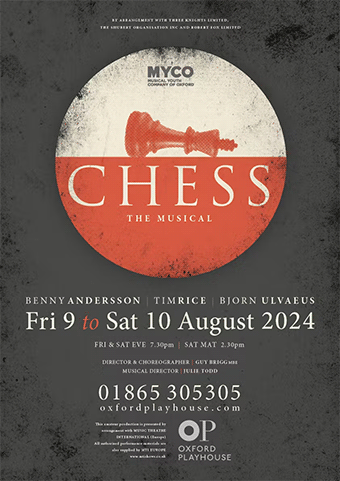When the Musical Youth Company of Oxford originally envisioned performing Chess the Musical, which they presented on the Oxford Playhouse mainstage earlier this August, things looked a little bit different. For one thing, there was yet to be a global pandemic.
This production is dedicated to the 2020 company, whose production was postponed, restructured and eventually canceled in 2020 due to Covid lockdowns.
Five years later, many of the original principals and company returned for this show, presenting at the Playhouse after only a week of intense rehearsal.
The ambitious and sprawling story behind this production mirrors the monumental plot of the musical itself, which attempts to be at once a metaphor for the Cold War, a history of chess, a love story, a story of rivals, of political intrigue, of childhood trauma, of what it means to belong, and much, much more. With 31 songs and a runtime of over two hours plus the interval, it would be an enormous undertaking for any company, and frankly astonishing to me that the MYCO performers were able to deliver it with poise, style and showmanship under such time constraints.
The plot, set amongst the tensions of the Cold War, revolves around the conflict between the current world champion, brash and arrogant American Grandmaster Freddie Trumper (Daniel North) and his cynical, reserved Soviet Russian challenger, Anatoly Sergievsky (Isaac Jackson) when they arrive in Merano, Italy for the World Chess Championships.
Both have a ‘second’ - a personal assistant hired to help the chess player prepare before and during a major match, and both seconds have motivations of their own. Freddie’s second is Hungarian-born, English-raised Florence (Grace Noble), who is also romantically involved with him and whose father went missing in the 1956 Hungarian Revolution, likely captured or killed by Soviet forces. Meanwhile, Anatoly’s second, Molokov, has schemes that extend beyond the chess board. Around them, diplomats from both nations plot to use players as their own pawns.
Florence becomes increasingly frustrated with Freddie’s difficult attitude, and drawn to Anatoly, who is attracted to her in turn. Complications ensue, and we’ve not even reached the interval.
The music for Chess was composed by Benny Andersson and Bjorn Ulvaeus of ABBA fame, and sports the outrageously catchy hooks that the group is known for (just try getting “One Night in Bangkok” out of your head). The book, by Tim Rice, is more frustrating. The show wants to be both a sweeping metaphor for the Cold War as a whole, and gripping personal story.
For me, it does not succeed on either count. This is partly because it takes several detours (do we need the song “Merano” - about the townsfolk of Italy excitedly preparing for the tournament?) and purports to be about chess before shoving it on the backburner for most of the plot.
I don’t quite understand why Rice didn’t hew closer to the endlessly fascinating story of real life American chess champ Bobby Fischer (on which Freddie is closely based) and his competition with the USSR’s Boris Spassky and Anatoly Karpov (who together form the inspiration for Anatoly Sergievksy). The fictionalised account may have been necessary to avoid legal complications, but the convoluted, maximalist plotting here quickly slips into melodrama: with multiple tragic childhoods, two dubious love triangles, and so many dramatic twists and turns that it just left me weary.
The plus side: the performers are truly terrific, particularly Daniel North, Isaac Jackson and Grace Noble have both the acting and singing chops to enthrall audiences. The ensemble should be applauded as well, maintaining the energy and rising to their many song and dance numbers with ease. Seb Mullett, Callum Bowyer, Maddy Rickard and Sebastian von Wenden shone especially bright.
In terms of set and sound design, there were some issues that did detract from my enjoyment of the production. The mics would often not fully kick in for the first second of each singer’s vocals, and even once they did, the sound mixing often left the performers buried under the sound of the instruments, despite some powerful voices in the mix.
The set incorporates a large projection screen, which was used absolutely brilliantly in a number set mid-match, with each move shown on a chess board on the screen, the ensemble dancing as the chess pieces below it; a truly effective and creative use of the space. However, during the more sombre numbers, slideshows of almost cartoonishly sad black and white photographs of a character’s impoverished childhood just seemed a bit daft. In other songs, the images felt generic and placeholder, and distracted from the richer worldbuilding happening onstage below them.
Ultimately for me this musical does not justify its length, but the production was well worth seeing solely for the talent of the team presenting it, and I will be thrilled to see what MYCO chooses to do next.





